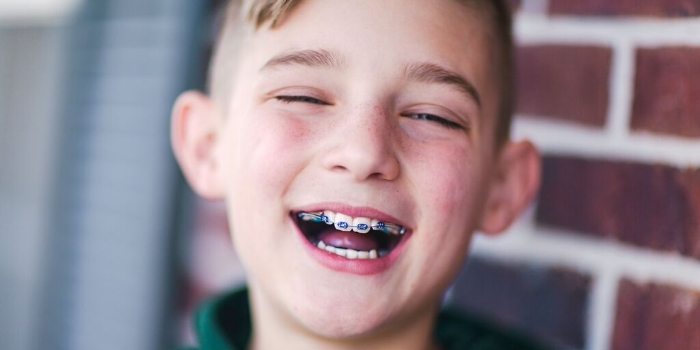How to help a child who is afraid of the dentist
Is your child scared of the dark? Worried about monsters under the bed? Or frightened by thunderstorms? There are lots of things that can trouble little minds. But what if your child has a fear of the dentist? After all, regular check-ups are an important part of looking after your little ones teeth. Here I’ll explain why some children develop dental anxiety, and share practical ways to help them feel more comfortable.

What percentage of children are scared of the dentist?
It’s hard to say exactly how many children are scared of the dentist. But studies estimate that around a third of children worldwide experience dental anxiety. It also appears to be more common in girls than boys.
Why are kids scared of the dentist?
There are lots of possible reasons for child dental anxiety. Your child might develop a fear of the dentist if they:
- had a negative or painful experience with a dentist in the past
- pick up on fear or anxiety from parents, carers or siblings
- are naturally more prone to feeling worried or anxious
- have a fear of needles or gagging
- feel unsettled by the unfamiliar sights, smells, sounds or equipment at the dentist
- have heard scary stories about dental visits from friends or on TV
- are threatened with the dentist as a consequence for not taking care of their teeth
How should I prepare my child for a dental appointment?
Try these tactics to help your child with dental anxiety in the lead up to their trip to the dentist.
Start from a young age
Introducing your child to the dentist at an early age can reduce their chance of developing a fear of the dentist later in life. Most experts recommend taking your child for a dental check-up when their first baby tooth erupts, or by their first birthday. But you could also bring them along to your own appointments to help them get familiar with a new environment.
Book your appointment for a good time
Your child’s mood probably changes throughout the day. So make their appointment for a time of day when you know they’ll be well-rested, calm and fed – such as after naptime.
Explain what’s going to happen
Let your child know exactly what to expect at the dentist and answer any questions they may have. Try to avoid using scary words like pain, hurt, injection or transferring any of your own fears onto your little one. Be honest with them whilst keeping things comforting and positive.
Read books and watch videos together
Spend some time in the weeks leading up to their appointment reading children’s books and watching videos about going to the dentist. It can help your child understand what will happen and make the dentist seem less scary.
Play pretend dentist at home
Take it in turns to play make believe dentist at home. Let your child be both the dentist and the patient. Practice using toy dentist kits, sitting in a big chair, making funny noises, opening and closing their mouth, cleaning and counting teeth.
Tell your dentist what your child loves
Give your dentist some insider tips on what your child does and doesn’t like. Does your little one go crazy for cars? Or are they delighted by dinosaurs? Let your dentist know in advance so they can build a rapport with your child.
How can I calm my child during a dental procedure?
On the day of the appointment, the following might help when managing a child with dental anxiety.
Set a good example
If you’re worried about going to the dentist, chances are your child will pick up on this. Try your best to appear calm and confident in front of your little one, so they can follow suit.
Choose a stop signal
If your child is old enough to understand, make it very clear before the procedure that they can stop at any point if they want. Agree on a simple signal, like raising their hand, to highlight that they need a break. This can help your child to feel more in control.
Distract your child
During their procedure, help your child to focus on something other than what’s happening in their mouth. Playing music through headphones, watching cartoons or videos, or talking to them could help to take their mind off things.
Teach your child to relax
It might help to teach your child some relaxation techniques to help them stay calm during their appointment. Ask them to use their imagination and visualise something that makes them happy. Or get them to fill up their belly with air like a balloon, and relax all their muscles as they let the air escape.
Demonstrate before doing
Your dentist will use a technique known as ‘Tell Show Do’ so that your child can see and understand what’s going to happen beforehand. They’ll explain what they’re about to do, demonstrate this on a random object or your child’s hand, before carrying out the procedure. This gives your child some time to get used to the instruments, sounds and sensations.
Give plenty of praise
During their procedure, give your child lots of praise and encouragement. Be specific about what they’re doing well, like sitting still or opening their mouth wide.
How can I help my child after a dental appointment?
Once your child’s check-up is complete, keep their confidence up with these tips.
Use positive reinforcement
Reward your child after their appointment so they form a positive association with going to the dentist. That could be telling them how well they did or treating them to something like stickers, lunch or a trip to the shops.
Schedule regular check-ups
Continue taking your little one for regular dental check-ups and don’t wait until there’s a problem to book an appointment. Regular trips to the dentist can lead to less dental anxiety in children. Experts recommend taking your child to the dentist every six months, and not leaving it more than a year between appointments.
See the same dentist
Ask your dental team if it’s possible for your child to see the same dentist every time, so they can build a relationship and feel comfortable at their appointments.
Real stories: Evie’s experience
Evie has Attention Deficit Hyperactivity Disorder (ADHD) and Autistic Spectrum Disorder (ASD), which means she can get quite anxious about visiting the dentist. Before getting her braces fitted, the Bupa Dental staff spent some time with Evie. Evie asked questions about the procedure, and the staff gave her the support she needed, helping her feel more at ease.
Transcript
How long will you have your braces for?
Two years.
Did the staff make you feel comfortable?
Yeah, especially India.
How often do you have to go to the orthodontist?
Every eight weeks.
What is your favourite drink?
Prime is my favourite drink.
Did the orthodontist talk you through what was going to happen?
Yes, they did.
What is your favourite tornado?
The Tri-state tornado.
What is your favourite animal?
My favourite animal is an elephant.
What is your name and how old are you?
I am Evie and I'm 12 years old.
Can you choose the colour of your bands?
Yes, and I'm going to get silver, a gold, and then rainbow
after that.
Do they have to tighten your braces?
Yes they do.
They do it every eight weeks,
but you get to pick lots of fun colours.
Did it hurt when you had your braces fitted?
No, but it did a little bit afterwards.
You just need to take a medicine like paracetamol
or something.
Do your braces hurt all the time?
They do every now and then, but
It will just ease off.
Do you look forward to going to the orthodontist?
Not always, but it's always fine when I get there.
Were you nervous when you first went to the orthodontist?
I was, but then they reassured me
and walked me through what was happening.
What is the walking man tornado?
It is a tornado that has little cyclones coming out of it,
and it looks like it's walking.
Can you tell me a joke?
What's the best time to eat bacon? Friday!
What did the team at Total Orthodontics do to make you feel comfortable?
The way they reassured me
and how they did it at the pace that I was comfortable with.
What is in your hands?
This is Johnny the Orange for ADHD.
It makes me feel good because it feels really squidgy.
What advice do you have for anyone that may be feeling anxious?
The orthodontists aren't scary.
You just need to ask them if you need it at your own pace
or if there's something you need done
to help you, just ask.
We now offer GP appointments for children under 18. Find out more about our Under 18 GP Service, call us on 0330 822 3072.
About our health information
At Bupa we produce a wealth of free health information for you and your family. This is because we believe that trustworthy information is essential in helping you make better decisions about your health and wellbeing.
Our information has been awarded the PIF TICK for trustworthy health information. It also follows the principles of the The Information Standard.

More mental health and wellbeing articles
Did you find our advice helpful?
We’d love to hear what you think. Our short survey takes just a few minutes to complete and helps us to keep improving our healthy lifestyle articles.
Legal disclaimer
This information was published by Bupa's Health Content Team and is based on reputable sources of medical evidence. It has been reviewed by appropriate medical or clinical professionals and deemed accurate on the date of review. Photos are only for illustrative purposes and do not reflect every presentation of a condition.
Any information about a treatment or procedure is generic, and does not necessarily describe that treatment or procedure as delivered by Bupa or its associated providers.
The information contained on this page and in any third party websites referred to on this page is not intended nor implied to be a substitute for professional medical advice nor is it intended to be for medical diagnosis or treatment. Third party websites are not owned or controlled by Bupa and any individual may be able to access and post messages on them. Bupa is not responsible for the content or availability of these third party websites. We do not accept advertising on this page.







